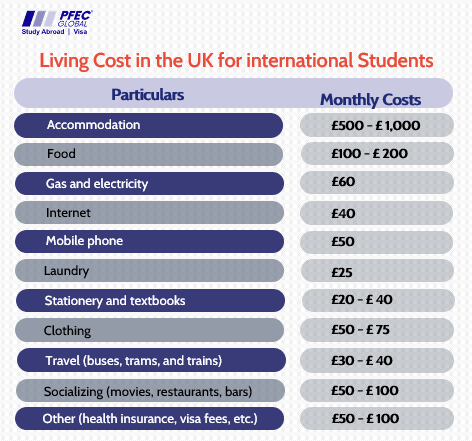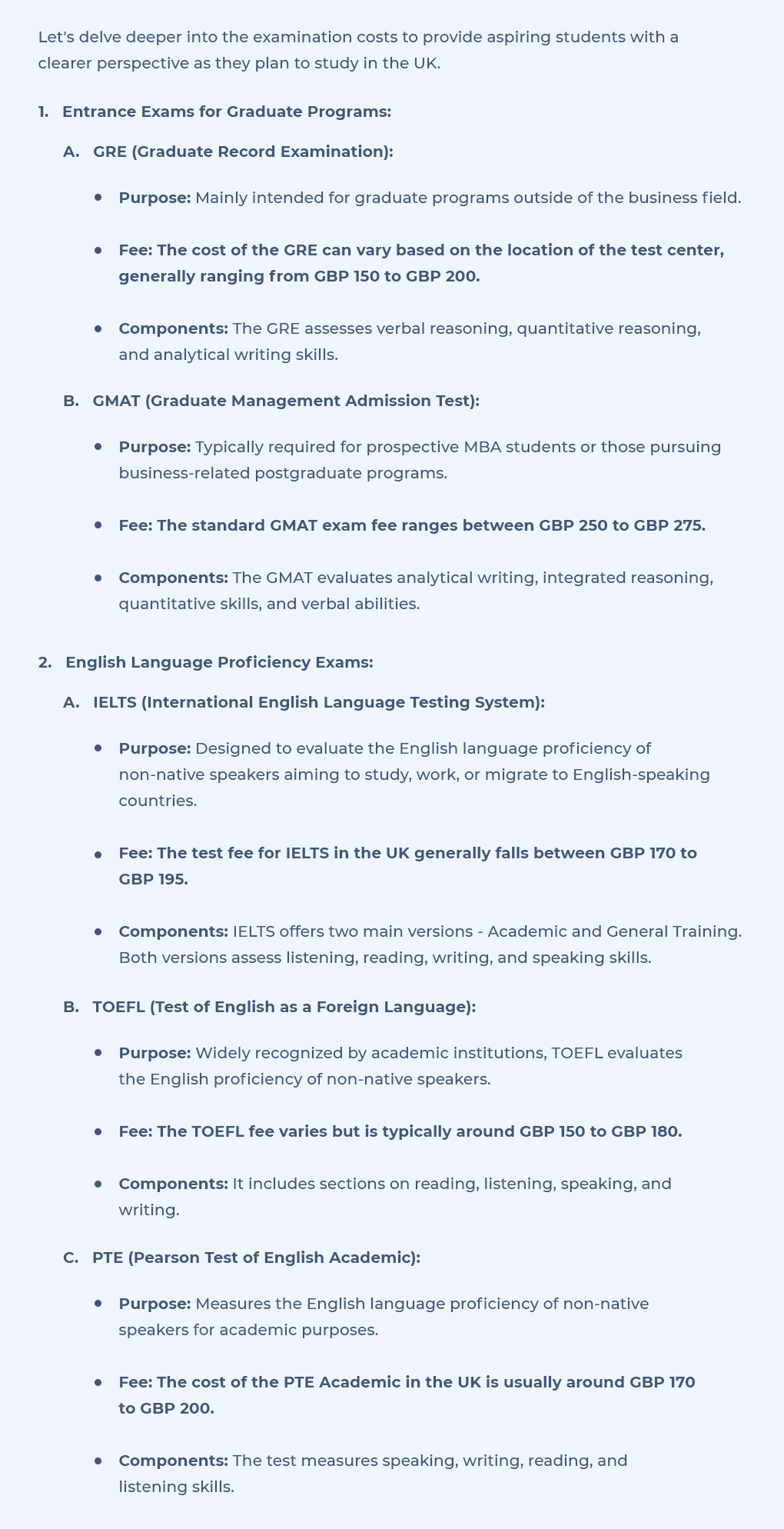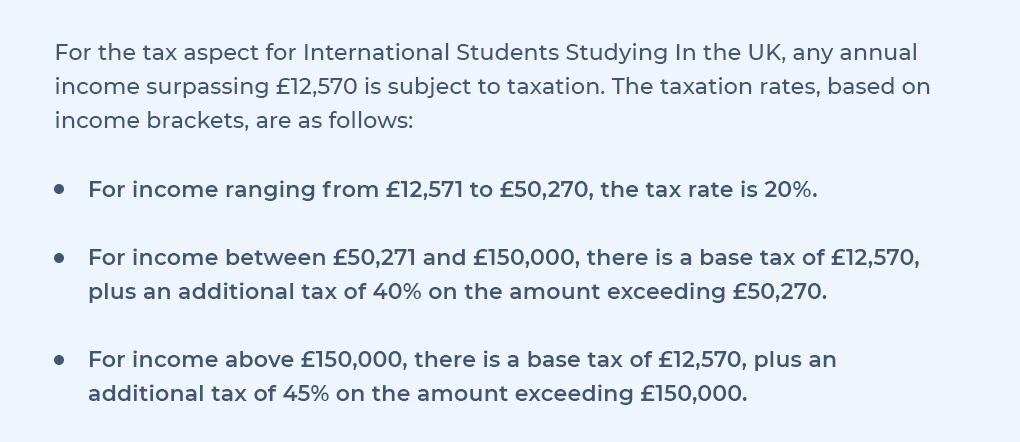

The United Kingdom has long been a popular destination for international students, and for good reason. UK universities are consistently ranked among the best in the world, offering a world-class education. The UK also has a rich culture and history, and is a welcoming and diverse country.
In recent years, the number of international students studying in the UK has continued to grow. As of 2022, there were over 600,000 international students enrolled in UK universities. This growth is being driven by a number of factors, including the UK's strong economy, its reputation for quality education, and its welcoming environment for international students.
In this blog we will cover the following topic: In this blog we will cover the following topic:
The educational landscape in the UK boasts globally esteemed institutions that offer a diverse range of courses, each with its unique tuition fee structure influenced by various key factors:
Institution Reputation: Renowned universities such as Oxford and Cambridge are often associated with higher tuition fees compared to less distinguished institutions.
Program Duration: The duration of study plays a pivotal role in determining the overall cost. While most undergraduate programs span three to four years, postgraduate courses can vary from one to two years or more, thereby impacting the financial commitment.

Specialized Disciplines: Specialized fields like medicine, engineering, or architecture tend to come with higher tuition fees due to the advanced equipment, resources, and specific training required.
Furthermore, scholarships and financial aid opportunities can significantly alleviate the tuition burden for international students pursuing academic excellence in the UK.
The United Kingdom offers a vibrant and enriching environment for international students, but it's important to be prepared for the associated living expenses. The UK boasts a high standard of living, which comes with its own costs that students should factor into their financial planning.
I. Accommodation: Accommodation costs in the UK can vary significantly based on factors such as location, type of housing, and amenities. Depending on your choice of university residences, private accommodations, shared apartments, or homestays, costs can range from GBP 90 to GBP 500 per week. The following table provides a detailed breakdown of accommodation costs based on the type of boarding.
II. Utilities: Apart from rent, utilities are an essential part of living costs. Expect to allocate between GBP 10 to GBP 280 per week for utilities, depending on whether they are included in your rent or not.
III. Meals: Budgeting for meals is essential for international students in the UK. Local supermarkets offer groceries that typically
IV. Monthly Living Costs: On average, international students in the UK require between 1,400 and 2,500 GBP per month to cover their living expenses, including housing, meals, and leisure activities. It's crucial to note that when applying for a student visa in the UK, students must demonstrate their financial capability to support their education and stay in the country.

V. Transportation: Public transport is a common mode of commuting for students in the UK. Certain universities collaborate with transportation providers to offer discounts for students. The cost of a student public transport pass varies by city and can range from 30 to 70 GBP per month. Bicycling is also a popular and cost-effective commuting option, with bike rentals costing around 40 GBP per day.
In conclusion, while studying in the UK offers numerous advantages, understanding and managing living costs is a crucial aspect of your international education journey. Accommodation, utilities, meals, transportation, and health insurance are essential factors that contribute to your overall budget. By planning wisely and exploring cost-saving options, international students can make the most of their experience in the United Kingdom.
Health insurance is an essential consideration for international students in the UK. The UK's National Health Service (NHS) provides free healthcare to UK residents, but international students are not eligible for NHS treatment. This means that international students must have their own health insurance in order to receive medical care.
The cost of health insurance for international students in the UK varies depending on the provider and the plan. However, it typically costs between £100 and £200 per month. There are a number of different health insurance providers in the UK, so it is important to compare plans and prices before choosing one.
To know more about Medical and Health care facilities for International Students in UK read our blog

When embarking on a journey of higher education in the UK, it's important to consider the expenses associated with study materials and equipment. Just like in other parts of the world, the cost of these essentials can vary based on the field of study you choose.
Textbooks and Reference Materials: The UK boasts a diverse array of academic programs offered by its renowned institutions. This often translates to the need for up-to-date textbooks and reference materials. Depending on your course,
Expenditures for books can range from £100 to £500 per year.
Fields like humanities and social sciences might lean towards the lower end of the spectrum, while specialized subjects could require higher investments.
Specialized Tools and Equipment: Disciplines such as science, engineering, art, and design may necessitate specific tools and equipment. From lab gear and artistic supplies to technical instruments, the costs can be notable. For instance,
Students in science-related fields might need to allocate around £300 to £1000 annually for specialized equipment.
Digital Resources and Software: Modern education is intertwined with digital resources and software. Online research journals, e-books, and course-specific software can be integral to your studies.
Setting aside approximately £50 to £200 per year for these resources is not uncommon, contingent on the nature of your program.
Stationery and Miscellaneous Supplies: The small expenses add up as well. Notebooks, stationery, printing costs, and other miscellaneous supplies play a role in facilitating your academic journey.
On average, budgeting around £50 to £150 per year for these supplies is a reasonable estimate.
Economical Approaches: To mitigate these expenses, resourceful students often explore second-hand bookstores, online platforms, or campus bulletin boards where fellow students might be selling their materials from previous years. Furthermore, university libraries across the UK offer comprehensive resources, from textbooks to digital databases, providing an avenue to significantly reduce costs.
The United Kingdom, renowned for its world-class universities and diverse academic programs, continues to attract international students. While the allure of studying in the UK is undeniable, navigating the initial steps, including the financial commitments associated with entrance and proficiency exams, can feel overwhelming.

Entrance exams like GRE and GMAT serve as crucial indicators of a student's readiness and capability for demanding postgraduate programs. Top universities utilize scores from these exams to make informed admission decisions.
English proficiency tests ensure that international students can effectively communicate, comprehend course material, and actively engage in classes, guaranteeing their success in an English-speaking academic environment.
Early Preparation: Beginning exam preparation well in advance not only improves scores but also allows sufficient time for retakes if needed.
Budgeting: Given these costs, prospective students should incorporate these expenses into their budgeting plans for their educational journey in the UK.
When it comes to pursuing education in the United Kingdom, understanding visa expenses is a critical part of your financial planning. International students intending to study in the UK typically apply for a Tier 4 (General) Student Visa. As of the latest available data, the application fee for a Tier 4 Student Visa varies depending on your circumstances:
Outside the UK: If you're applying from outside the UK, the standard application fee is GBP 348.
Inside the UK: If you're applying from within the UK, the fee is GBP 475.
To know more about Student Visa for UK Read our Blog: A comprehensive Guide to Student Visa for UK Types, Requirements, and Application Process

The UK is home to some of the world's most iconic landmarks, charming villages, and stunning natural beauty. As an international student, the experience is not just limited to the classroom; exploring the beauty and cultural dynamism of the UK is integral to the overall experience.
However, indulging in these activities does come with its set of expenses.
Natural Attractions: The UK is home to some of the world's most popular natural attractions, including the Lake District, the Scottish Highlands, and the Cotswolds. While some of these activities can be costly (e.g., a day trip to the Lake District can cost over £100), there are always budget-friendly alternatives like hiking or visiting local parks.
Cultural Experiences: The UK is a melting pot of cultures, and there is no shortage of things to see and do in terms of cultural experiences. From world-renowned museums and galleries to iconic landmarks like Buckingham Palace and the Tower of London, there is something for everyone. While some of these activities can be costly (e.g., a ticket to the British Museum can cost over £20), many museums and galleries offer student discounts.
Dining and Nightlife: The UK has a diverse and vibrant food scene, with everything from Michelin-starred restaurants to traditional pubs. On average, a meal at a mid-range restaurant could cost around £20 to £30. Nightlife in the UK is also a popular activity, with many cities having a thriving bar and club scene. While some clubs may charge a cover charge, many offer student nights with discounts on drinks.
Sports and Fitness: For those inclined towards fitness, the UK has a range of options from gyms to outdoor sports activities. A monthly gym membership can average £30 to £50, while renting equipment for sports like rock climbing might have a weekly cost.
Personal Shopping: Whether it's buying souvenirs, clothes, or personal care items, shopping can add to the weekly budget. Many cities host weekend markets offering unique finds at affordable prices.
Travel: Inter-city or international travel is popular among students, especially during semester breaks. Budget airlines, buses, or trains can be an economical way to explore the country, but these travel costs, coupled with accommodation and activities, can add up.

International students in the UK are allowed to work part-time, which allows them to not only support themselves financially but also gain valuable work experience in a different cultural environment. Under the terms of a Tier 4 Student Visa, students are permitted to work up to 20 hours a week during term time and full-time during university breaks.
While the prospect of earning through part-time employment is beneficial, it's vital to comprehend the UK's taxation regulations associated with such earnings. Before engaging in work, students are required to obtain a National Insurance Number (NINo), a unique identifier for tax and social security purposes. The process involves an application and an in-person appointment, and it is advisable to initiate the process well in advance.

It's essential to stay updated on tax regulations and changes in the UK, as these can impact your earnings and obligations. Part-time job options for international students in the UK are diverse and include roles such as:
Retail and Hospitality: Opportunities in retail stores, cafes, restaurants, and hotels offer flexible schedules.
Administrative Assistant: Gaining experience in administrative tasks and office environments can be valuable.
Tutoring and Teaching Assistance: Sharing your knowledge through tutoring or assisting in classes is a popular option.
Customer Service: Working in customer service roles enhances communication skills and customer interaction.
By being informed about both the work opportunities and taxation procedures, international students in the UK can maximize their earning potential while managing their tax responsibilities effectively.
Many UK universities offer scholarships, grants, and fellowships to international students, which can significantly reduce the financial burden. Each scholarship has its unique set of eligibility criteria, set forth by the respective providers.
Nevertheless, the majority of these scholarships are open to all international students, ensuring that financial constraints don't hinder deserving candidates. For a comprehensive list, the official 'Study in UK' website serves as a rich resource.
Highlighted below are some notable scholarships available to international students:
In addition to the scholarships mentioned above, prospective students can explore various other funding options provided by individual universities, government bodies, and international organizations. Proper research and preparation are key to identifying and applying for suitable scholarships that can help alleviate the financial burden of studying in the UK.

When contemplating higher education options, it's natural to consider the financial implications. In this regard, the United Kingdom often presents a compelling case. A comprehensive comparison with renowned education giants like the USA and Australia reveals a noteworthy insight. The costs associated with studying in the UK frequently align with, and in some cases, are even more economical than those in the aforementioned countries. This observation gains prominence when assessing factors such as the quality of education, employment opportunities, and overall living standards.
A meticulous examination of the relationship between educational excellence and expenditure across prominent global academic hubs showcases the UK as an exceptional cost-effective choice for prospective students. Notably, tuition fees and living expenses in the UK are often more favorable compared to countries like the US and Australia, without compromising the standard of education. Moreover, the UK boasts a reputation for maintaining one of the highest living standards globally, which further enhances its attractiveness as a destination for international students seeking a balance between quality education and budget-conscious decisions.
Embarking on a journey to study in a new country is an exciting endeavour, but it also comes with the task of efficiently handling finances in an unfamiliar environment. The combination of living costs, tuition fees, and personal expenses can accumulate rapidly. Nonetheless, with prudent planning and strategic approaches, international students can smoothly navigate their academic path in the UK without undue financial pressure. Here are some comprehensive tips to skilfully manage expenses:
On-campus Opportunities: Many universities offer job positions within the campus, such as in libraries, cafeterias, or administrative departments. These jobs often align with academic schedules and minimize commuting time.
By implementing these strategies, international students can expertly navigate the financial aspect of their educational journey in the UK, ensuring a balanced and economically sensible experience.
Studying in the UK offers a wealth of opportunities for personal and academic growth. By understanding the costs associated with education and life in the UK, international students can make well-informed decisions and prepare themselves for a rewarding experience.
In conclusion, the cost of studying in the UK for international students encompasses various factors, from tuition fees and living expenses to additional costs and potential income through part-time work. Proper financial planning and budgeting are essential to ensure a successful and financially manageable education journey in the United Kingdom.

Studying abroad is an exciting and life-changing experience that offers students a chance to gain a global perspective and valuable exposure ...

In our rapidly globalizing world, where boundaries are melting away and opportunities abound, proficiency in the English language has become ...

Choosing to pursue higher education abroad is an exciting and life-changing decision. Among the plethora of options available to internationa...

Studying abroad is a life-altering adventure that opens doors to new cultures, experiences, and opportunities. Among the plethora of global s...

Australia, renowned for its world-class education and diverse cultural experiences, continues to be a favoured destination for international ...

Australia is not just famous for its iconic Sydney Opera House, the Great Barrier Reef, and its unique wildlife; it is also recognized global...

Studying abroad is a life-changing decision, and with so many options available, it can be overwhelming to choose the right country and univers...

As of March 2022, Australia has seen a consistent rise in its international student numbers, with enrolments reaching 440,219. This marks an ...